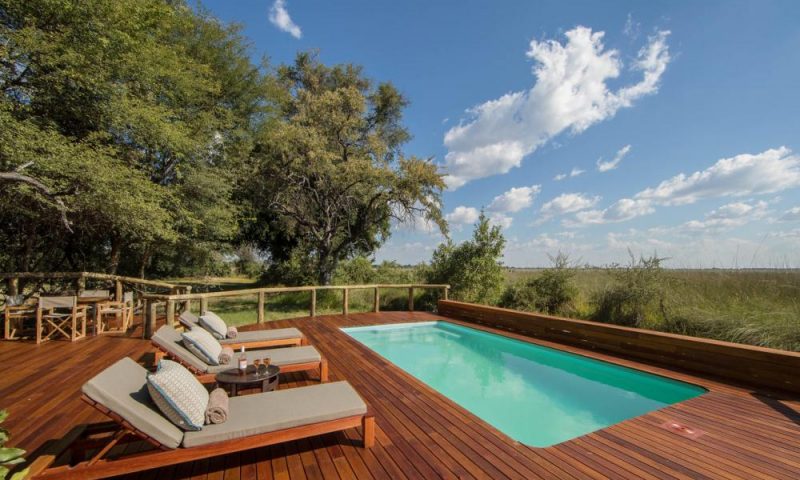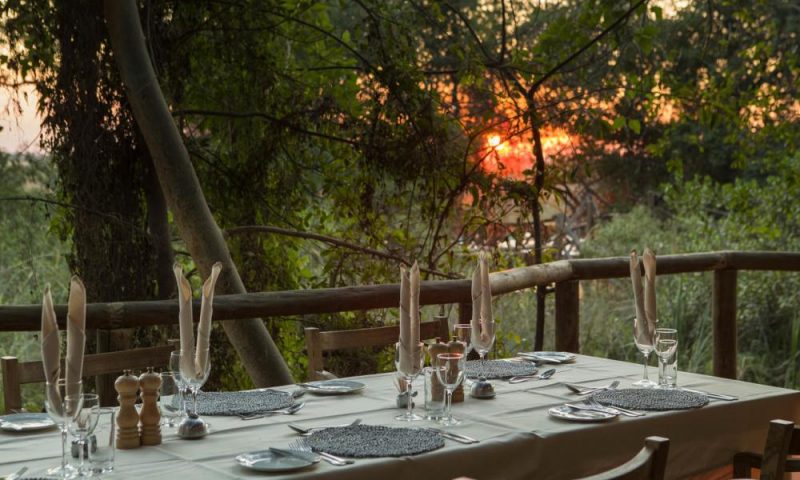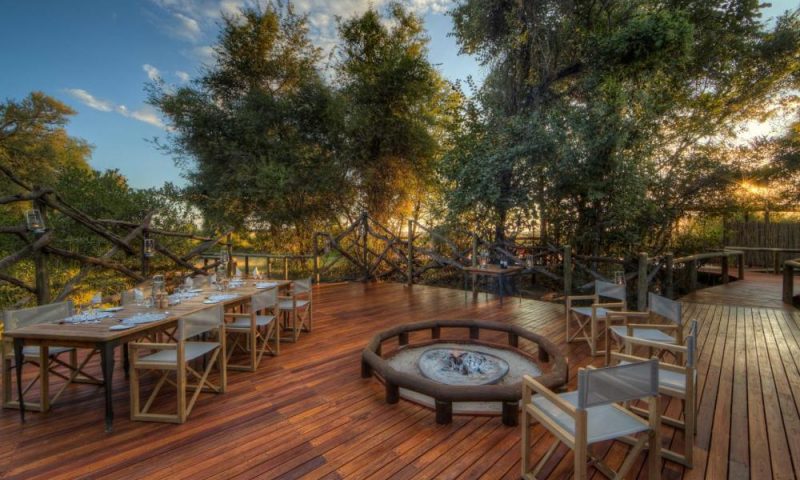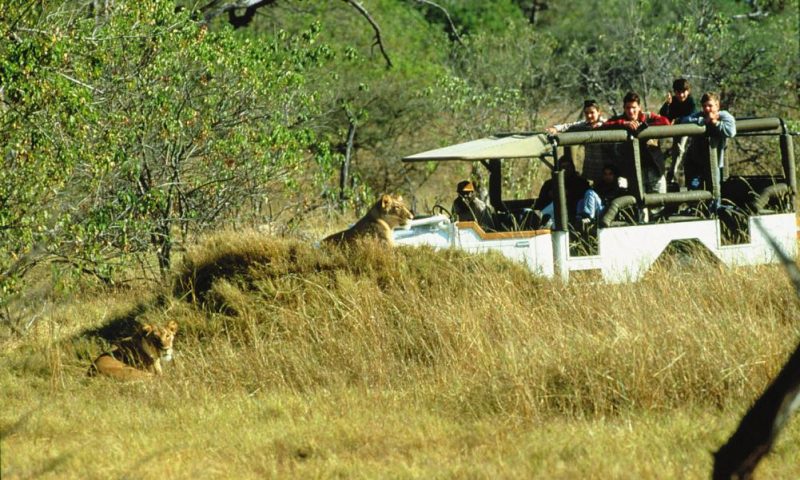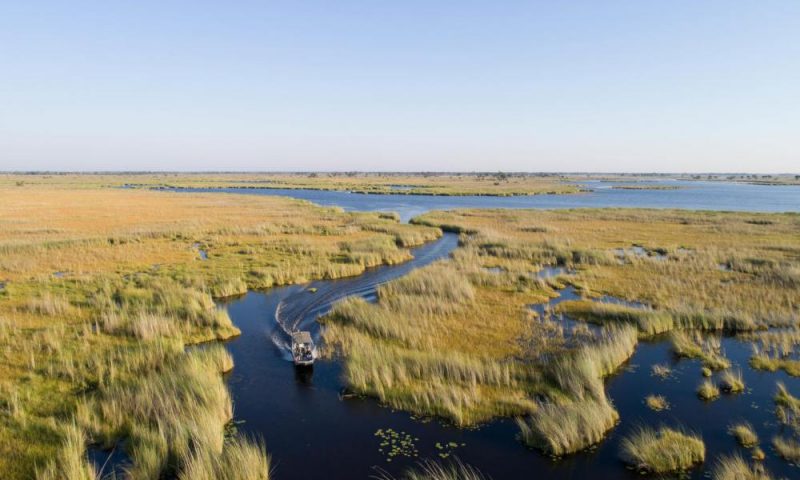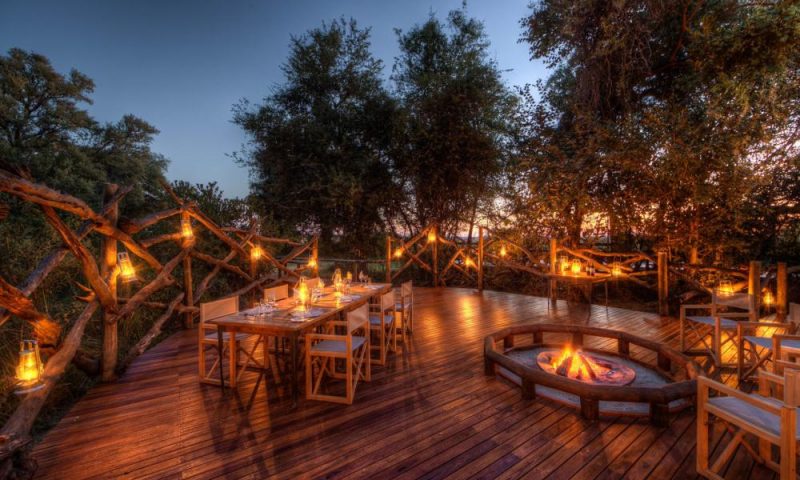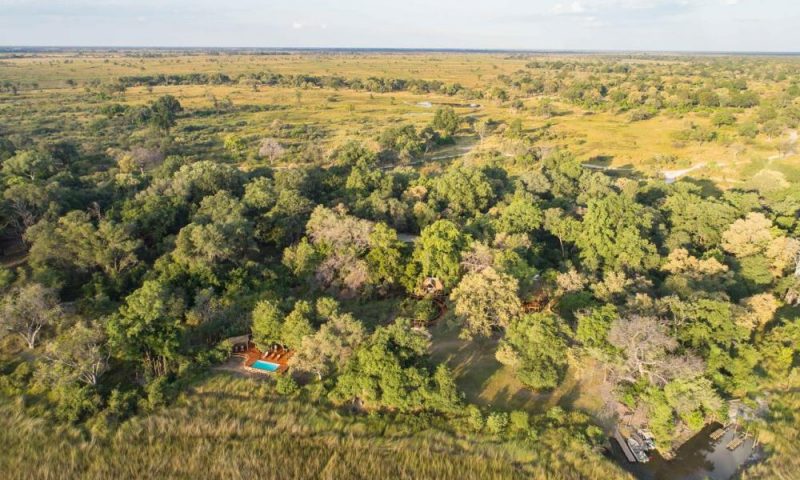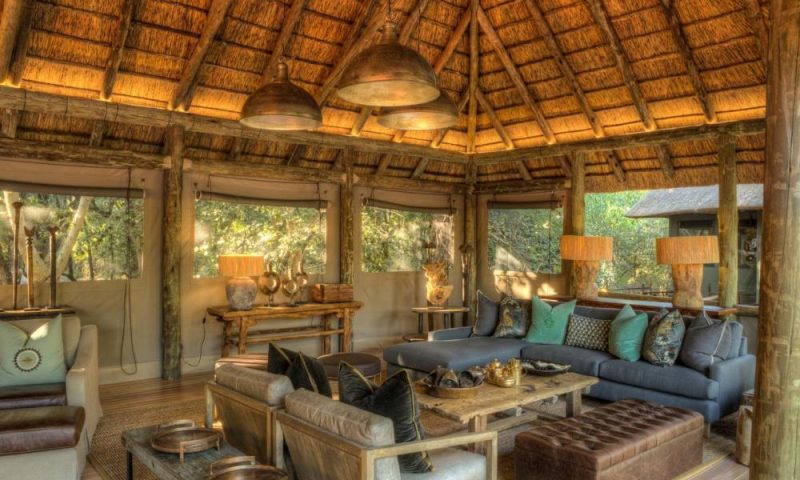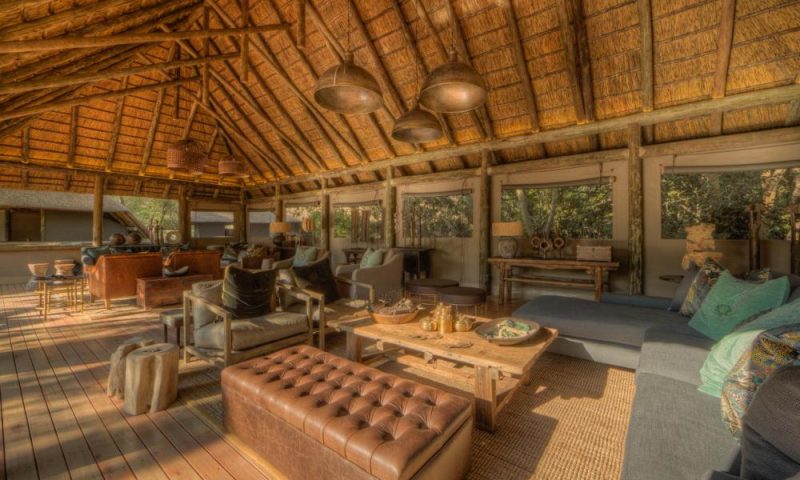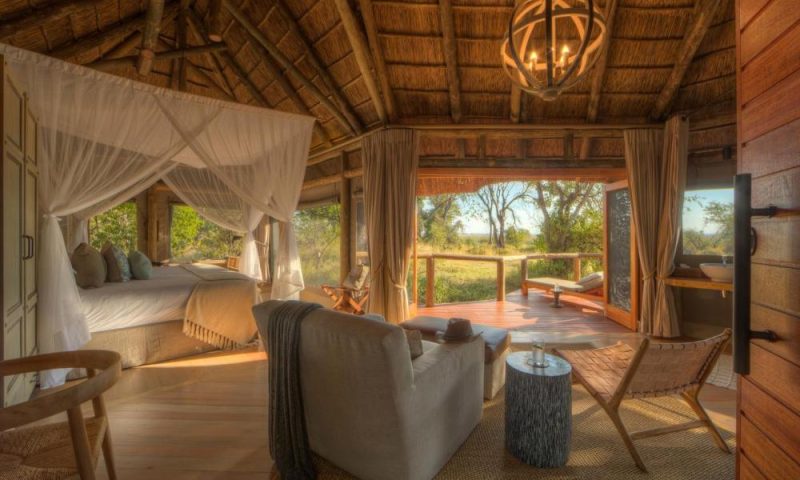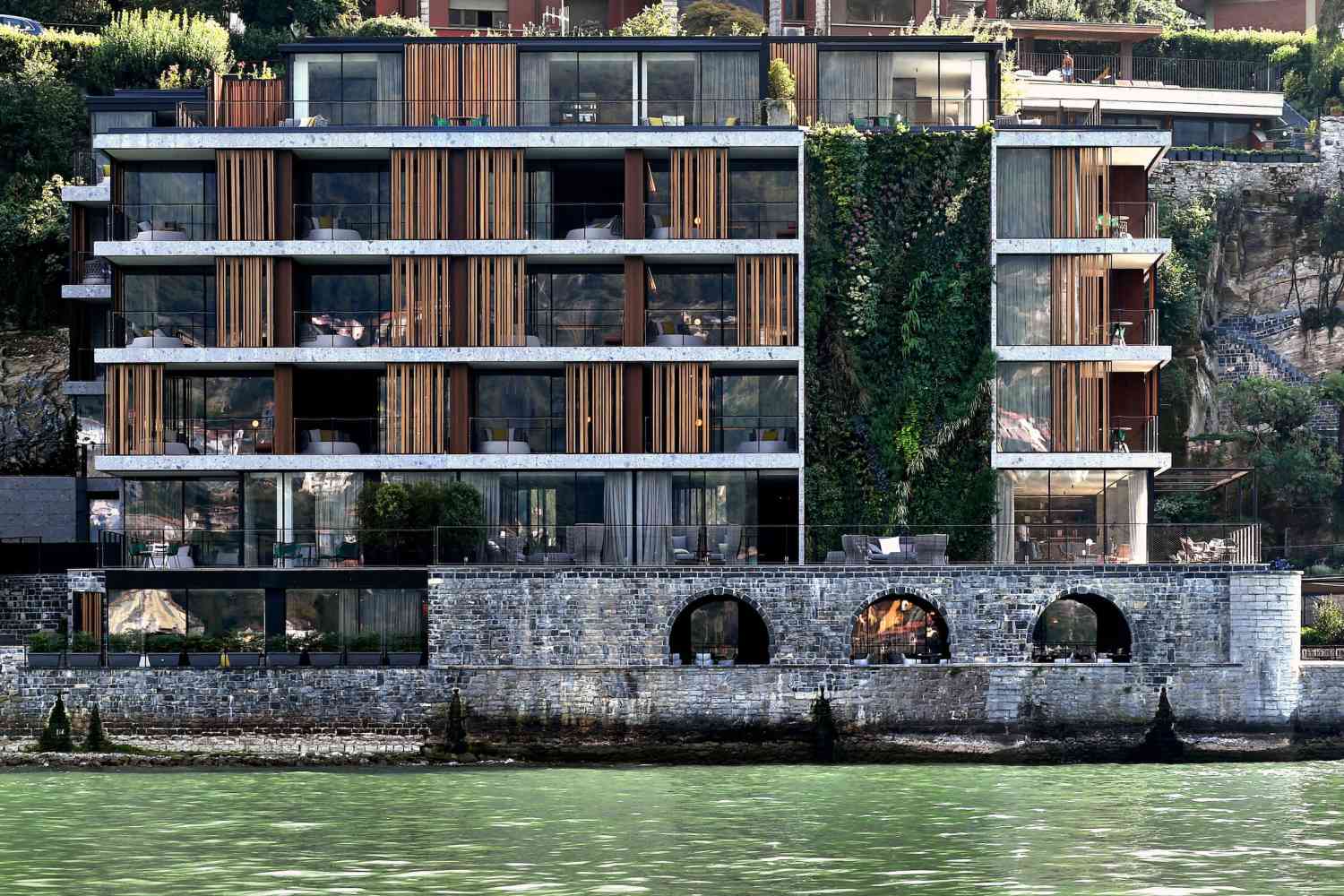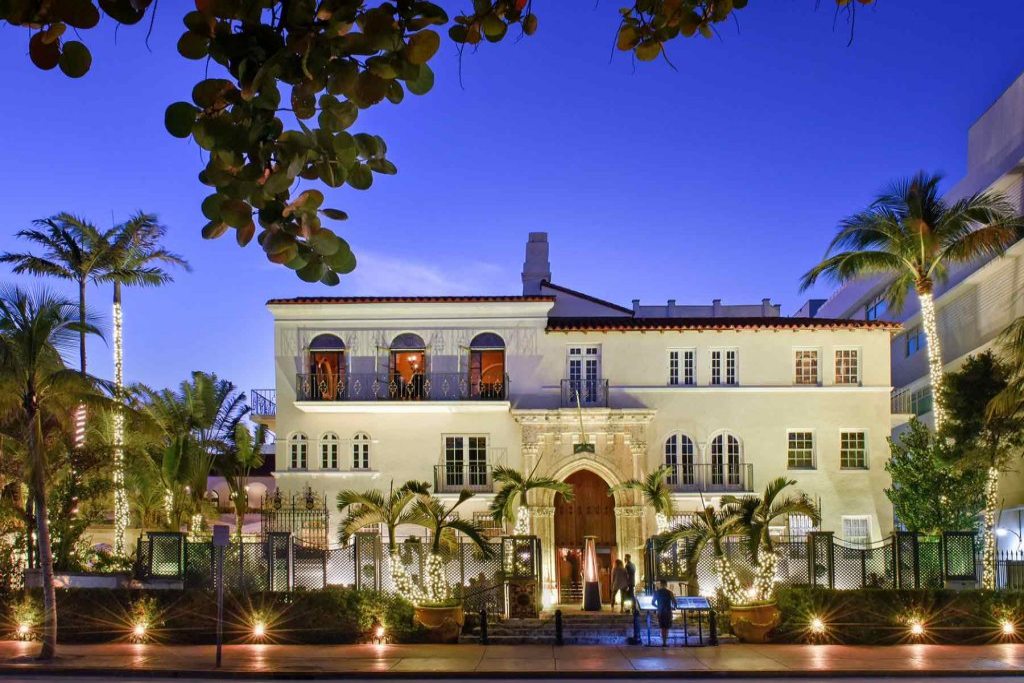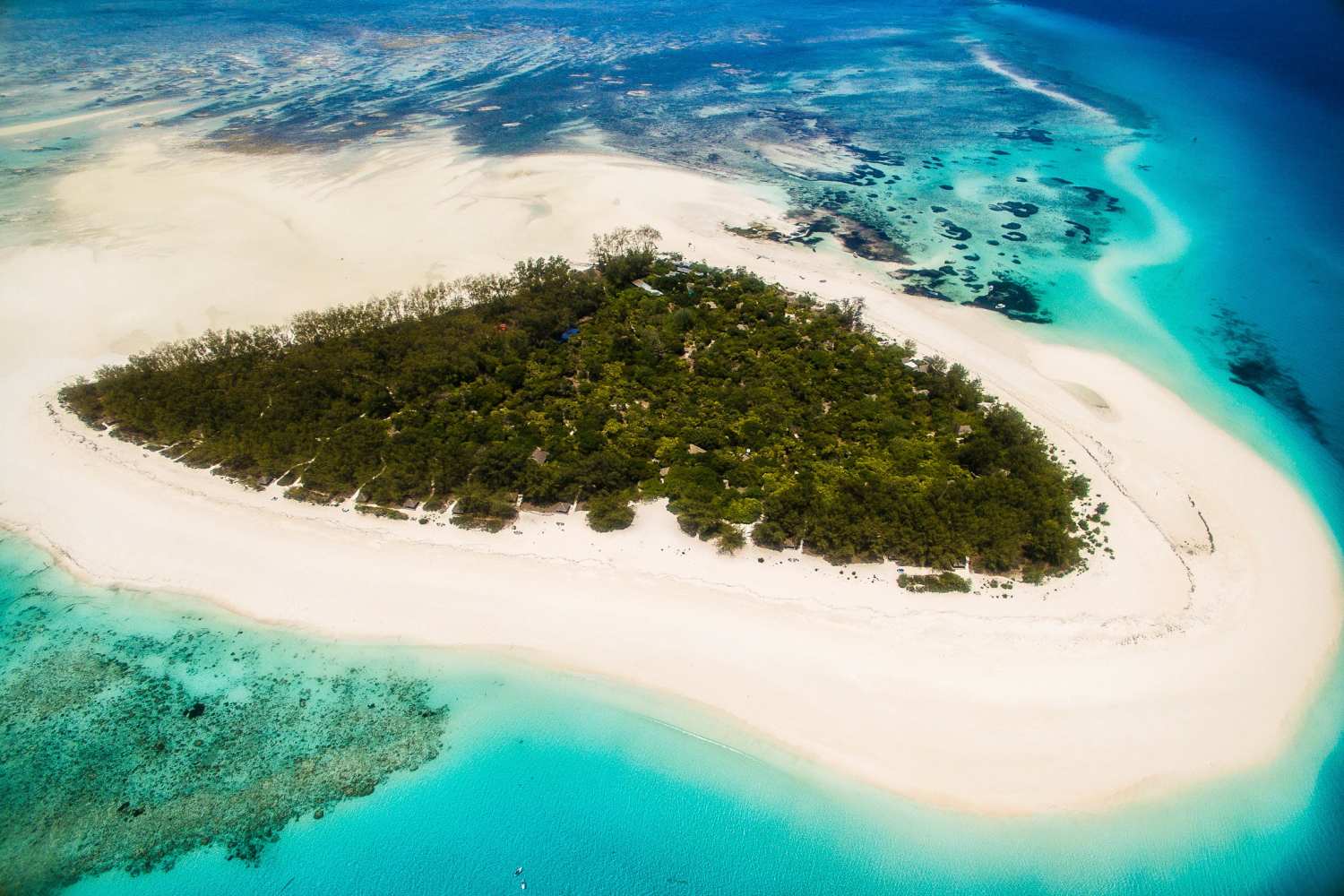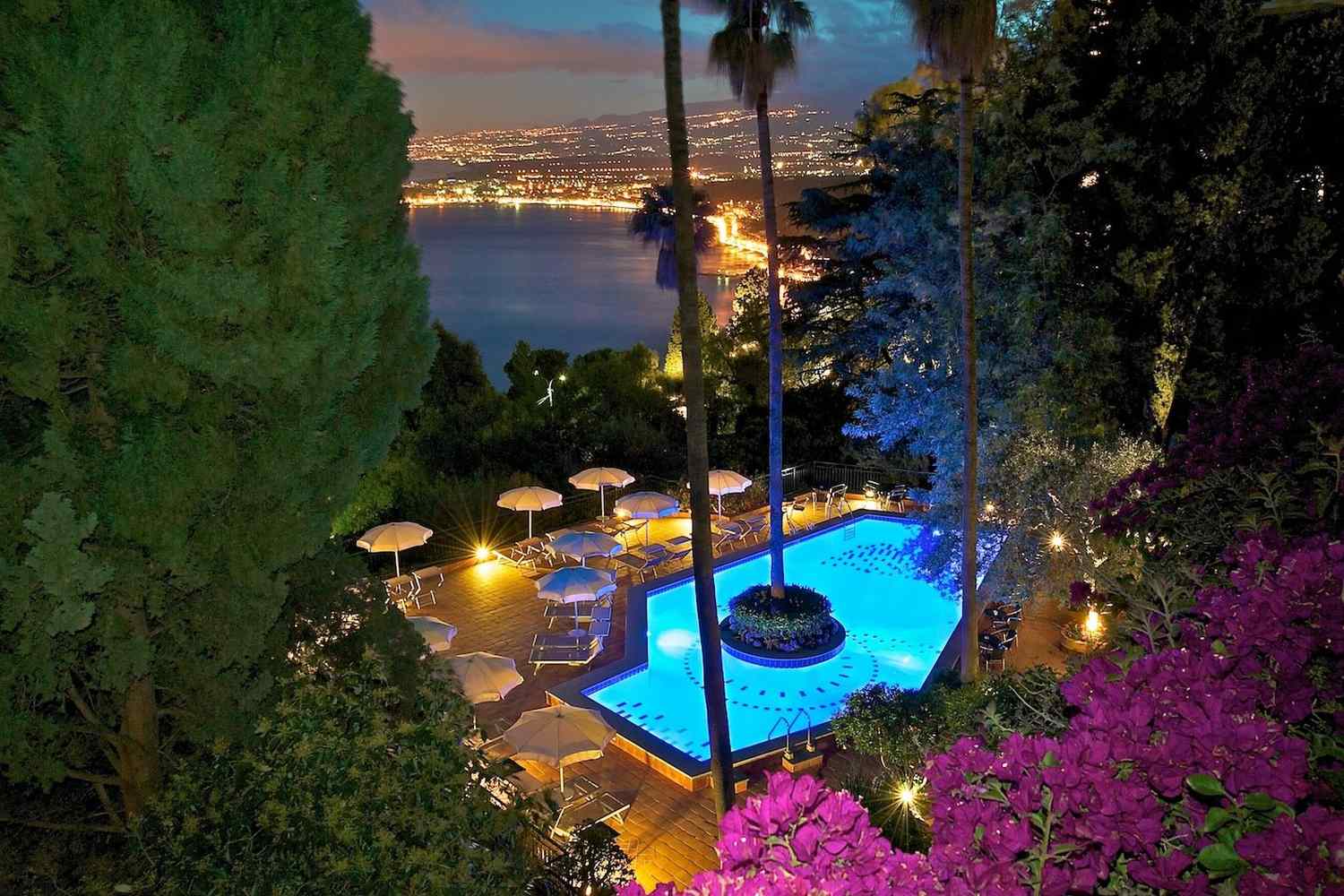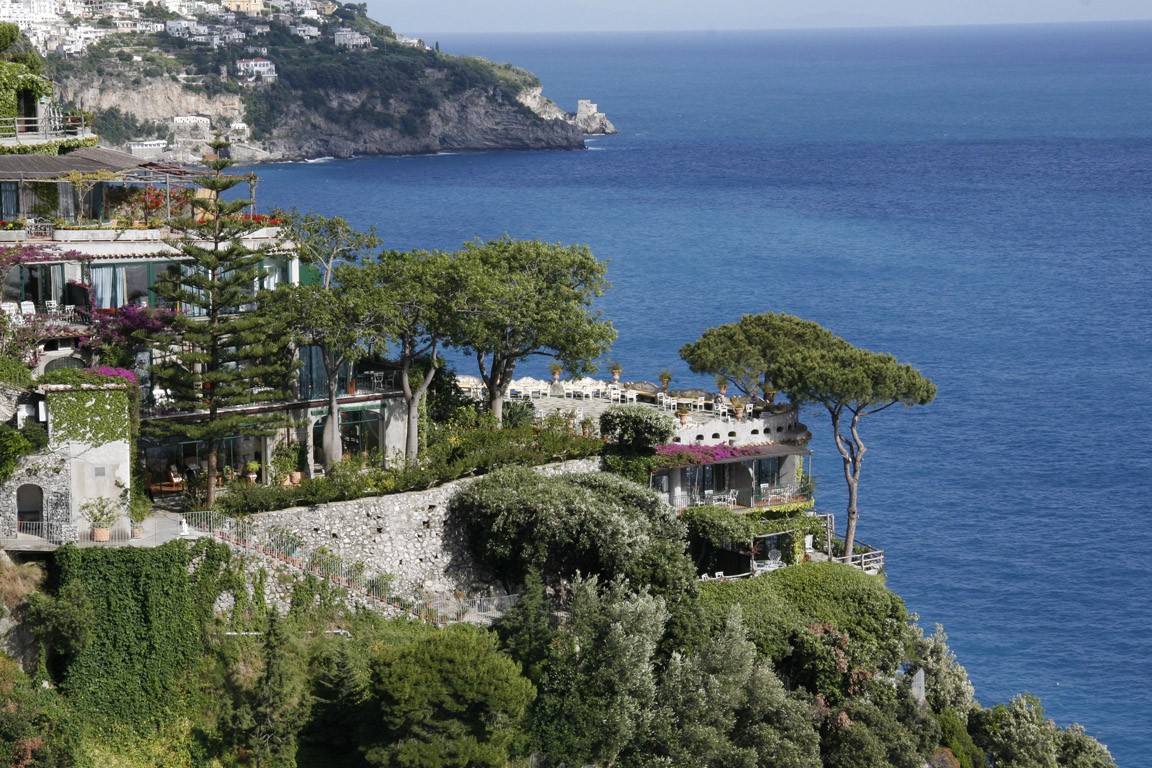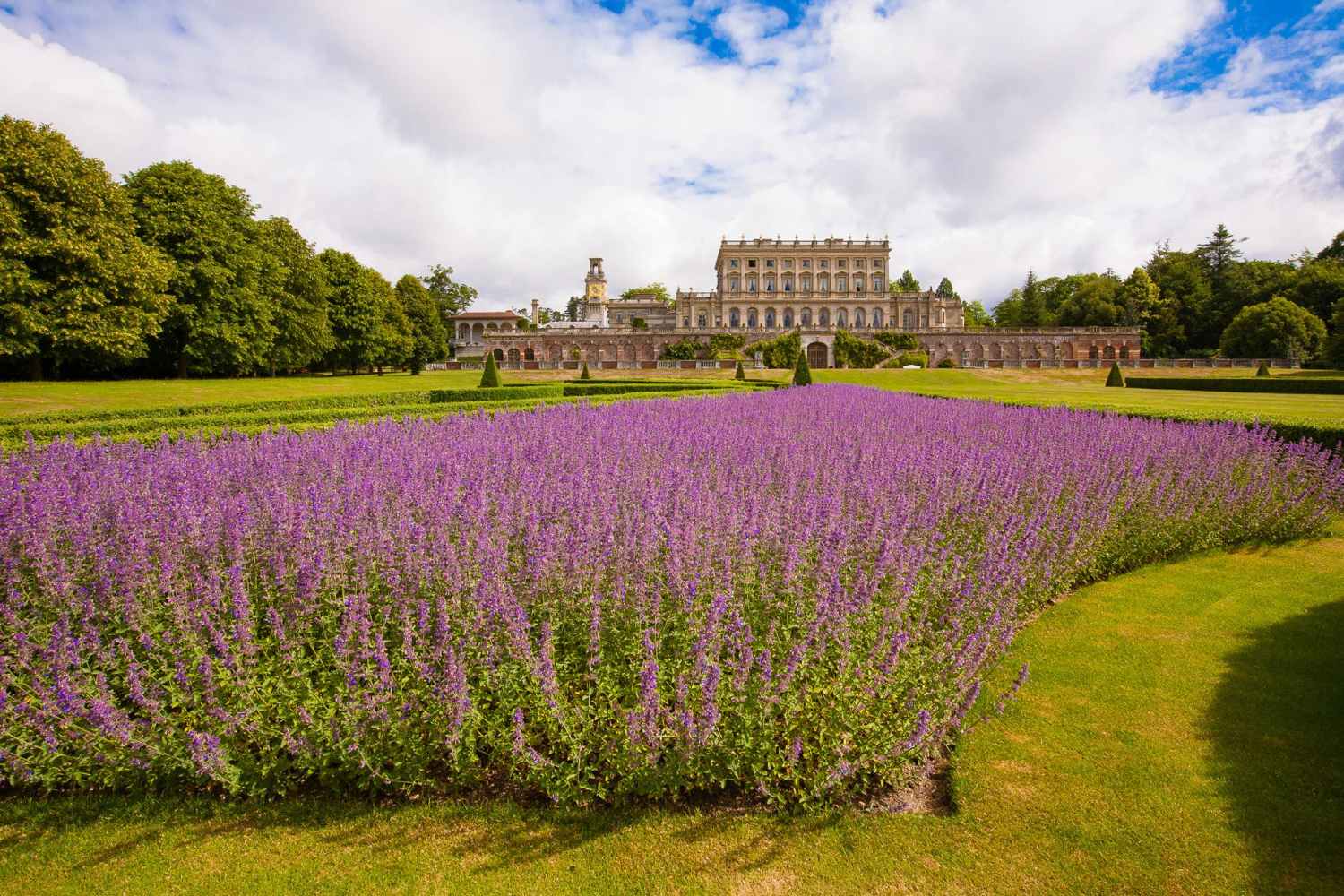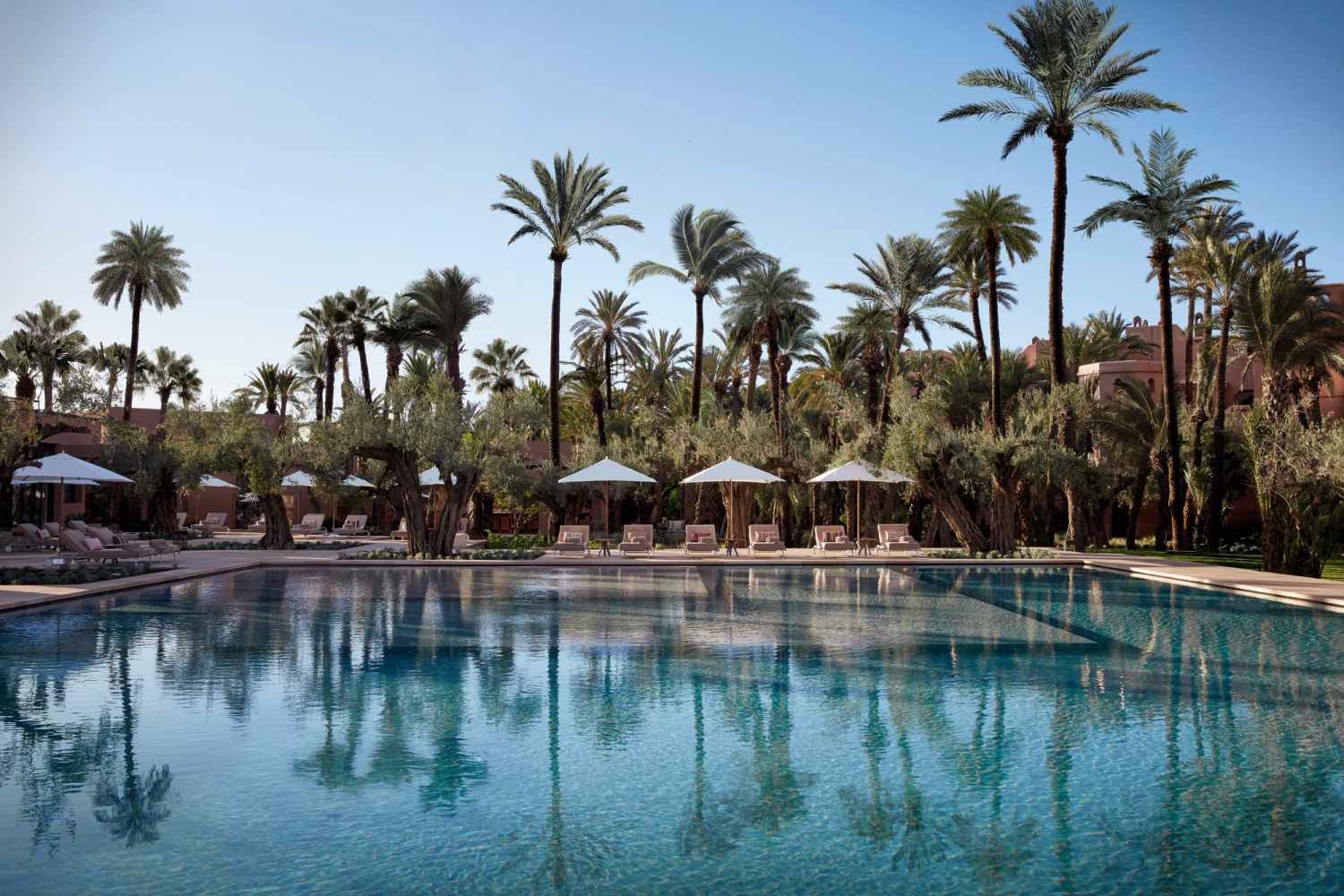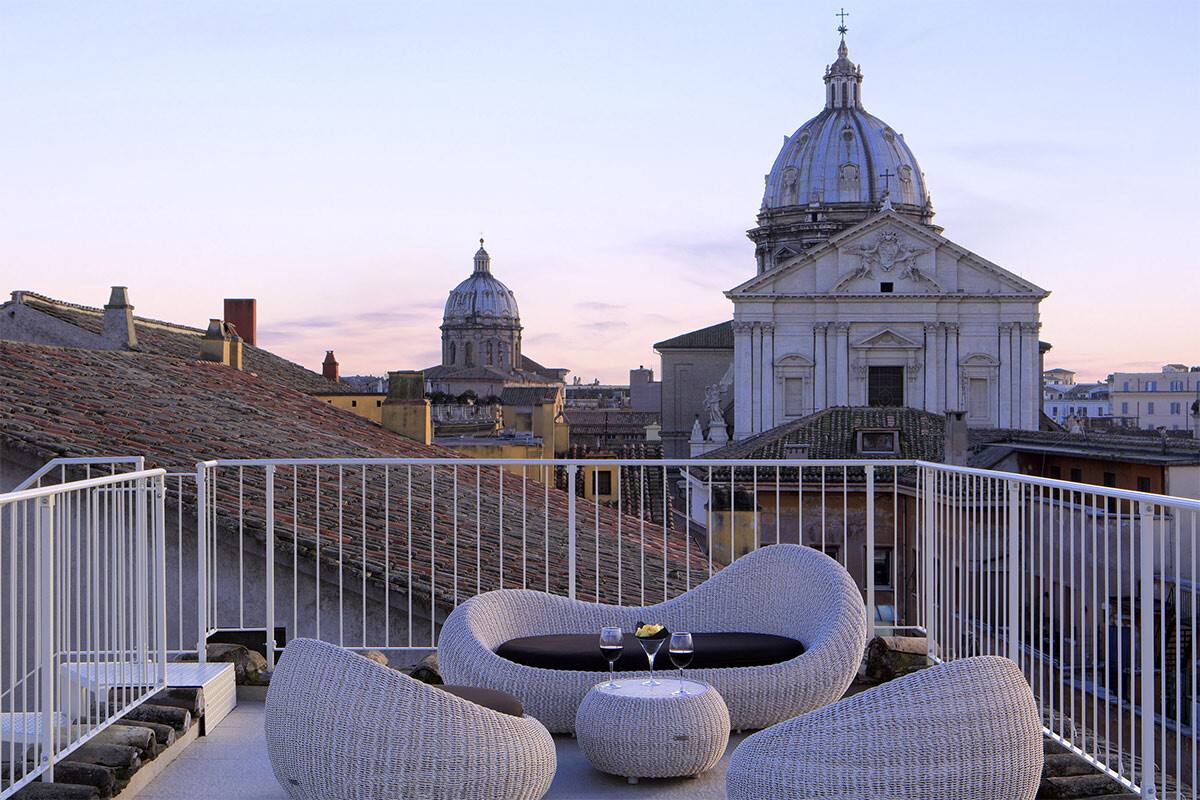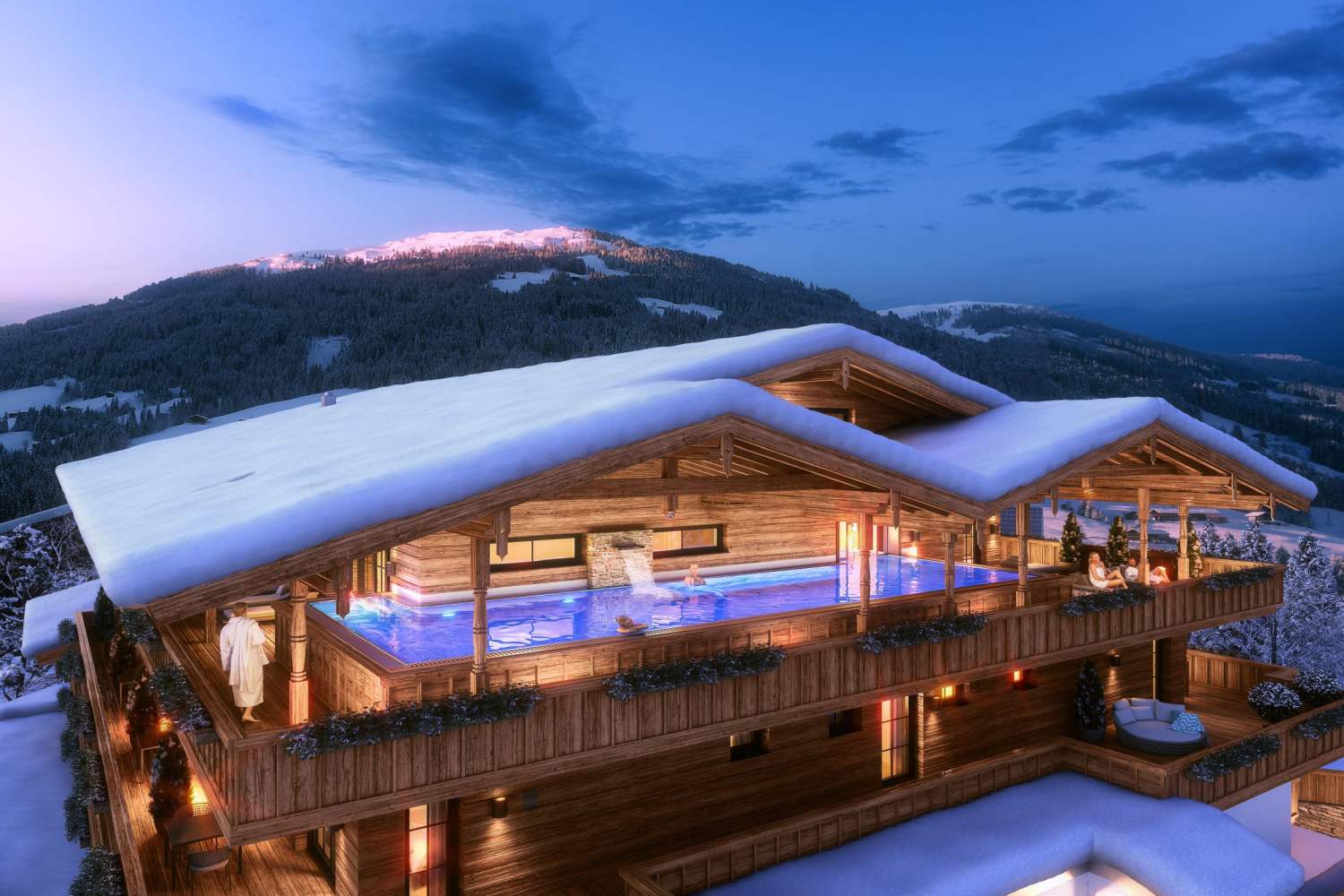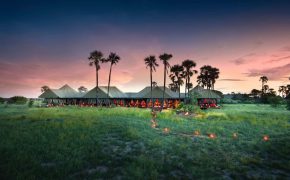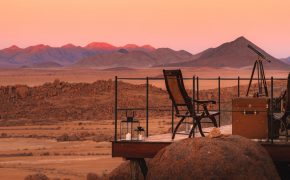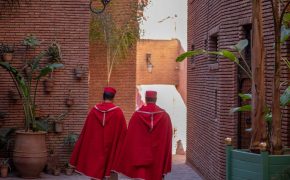Situated in the world-renowned Moremi Game Reserve, Camp Moremi enjoys breath-taking vistas over the Xakanaxa Lagoon. Nestled within a natural riverine forest of teak and ebony trees, twelve tented safari suites have an East-African flavour and a classic touch.
Hidden in lush green trees and branches, it feels like you are walking in an African fairytale forest. Enjoy outside dinners under an amazing starry sky, let a professional staff pamper you with their humour and warmth, dive in the large pool, start your day with homemade pancakes and enjoy excellent elephant, lion and leopard sightings (among many other species).
With no Wi-Fi connection, you are truly away from your fast pace life. Move with the rhythm of elephants, smell the sweet, warm breeze and explore African land and waters – you will leave Camp Moremi with an everlasting experience (and new friends). Feel at home.
The suites feature glass sliding doors opening out to private decks where you can enjoy manicured bush views and an attractive woodlands setting. All tents are beautifully decorated, with a soft, king size bed, luxurious en suite bathroom, comfy chairs and a desk to write down all your safari memories.
Traditional thatch and timber communal spaces invite you to relax or read, since the elevated lounge includes a wildlife reference library. Nestle yourself down on the viewing platform and marvel at extensive panoramas, mind blowing sunsets (with amazingly coloured African skies), and hippos at the lagoon.
For breakfast, lunch and tea, of course, venture out to the outside boma. There is nothing like a meal in the fresh African air. After an exhilarating safari day, order yourself a cocktail at the bar and reminisce about today’s wildlife sightings, while a homemade dinner is prepared.
Activities at Camp Moremi
Camp Moremi is located in a diverse area: you will explore African bush, large open savannahs, lush green forests, water holes (attracting an abundance of thirsty wildlife) and papyrus-filled, Delta waterways.
You will enjoy tracking big game during morning and evening games drives, and boat excursions to discover bustling river life. Although night drives and off-roading are not permitted through the Moremi, the camp’s premier setting ensures you are always part of the natural wilderness.
A boat excursion is a particularly unique, Delta experience. Glide through tall grasses, blooming water lilies and bump into an elephant herd seeking a refreshing splash.
Besides many elephants, lion herds, leopards and hippos, this area is known for a vast number of antelope, including Impala, Kudu and Waterbuck. And do not forget the birding in the area; if it is spring season, you might encounter roosting areas with countless flocks.
Also, the imposing Fish Eagle and vivid Malachite Kingfisher are often seen, and even the rare, Pel’s Fishing Owl occasionally makes a visit. Great birding, excellent guides, outstanding wildlife viewing, delicious dinners in the bush, warm, African hospitality – all this makes for an intense safari under the dense green trees of Camp Moremi.
About Moremi Game Reserve
The Moremi Game Reserve initially consisted mostly of the Mopane Tongue area, but in the 1970s the royal hunting grounds, known as Chief’s Island, were added. Let us share a few more facts about this area to introduce it properly.
The Moremi is home to the most endangered species of large mammals: the cheetah, white rhinoceros, black rhinoceros, African wild dog and lion.
Over 500 bird species (from water birds to forest dwellers) and over a 1.000 species of plants are also recognized in the Moremi. This ecosystem is amongst the richest in Africa. And thanks to effective protection, the flora and fauna is relatively undisturbed.
UNESCO world heritage – Okavango & Moremi
Within the larger UNESCO listed Okavango Delta Game Reserve, Moremi covers about 40% of the Okavango. The Moremi and the Okavango Delta is one of the few interior delta systems that do not directly flow into the ocean or sea.
The annual flood makes for a spectacular interaction between water and wildlife, as animals synchronize their cycles with this seasonal flood. Discover a unique land while staying in one of the intimate lodges in the Moremi and let the river take you on an adventure.
Lifeline
The Okavango River acts as the lifeline of the Okavango Delta and the Moremi Game Reserve. Coming all the way from the Angola Mountains, 1.600 kilometers further west, it flows deep into Botswana, seeking the Indian Ocean.
Luckily for the wildlife in Botswana, these fresh, clear waters never actually find the ocean, as they sink in the dry sand of the Kalahari Desert. But, before that happens, it creates the largest oasis in Africa.
Created by inhabitants – Moremi Game Reserve
Explorer David Livingstone left the Moremi area in 1848, overwhelmed by the beauty of it. Soon after, unfortunately, more Europeans discovered it, which led to the depletion of wildlife.
The people of Botswana felt they had to protect their land and proclaimed the area as a protected game reserve in 1963, with the Chief’s wife spearheading the project. Soon after, without the need for urgent revenues, Botswana was able to develop an ecotourism policy.
This resulted in low–impact lodges, leaving only a small footprint. This guarantees you an unforgettable African experience – in the most natural and unspoiled way possible. Moremi truly is a wildlife paradise.
Meet Moremi’s flora and fauna (and be in awe)
The Moremi Game Reserve protects the central and eastern areas of the Okavango Delta. By combining drier areas and waterways, the contrasts are astonishing. Imagine views of savannah game as well as birdlife around the rivers, or elephants and hippos splashing in the lagoons.
Often referred to as a ‘Garden of Eden’, the Moremi Game Reserve offers excellent game viewing year-round and stunning landscapes of savannah, floodplains, lagoons, dense forests (where leopards and wild dogs hide) and winding rivers.
Enjoy the opportunity to get the complete Big Five in front of your camera lens; since the reintroduction of the impressive (white) rhino, the quintet is complete again. Elephants, hippos, buffalos, blue wildebeests, impalas, red lechwe, giraffes, impalas – they all love to take a splash in Moremi’s fresh waters.
And is spotting the rare wild dog on your list? This smart hunter also calls the Moremi his home; the people of Botswana cherish their strong population of wild dogs. And don’t forget to look up: the shy cheetah loves to drag its fresh kill high up in a tree and enjoy a meal undisturbed.
Twittering from over 500 birds in Moremi
Whether you are already a bird enthusiast or not, these magnificent creatures come in large numbers in the Moremi, and quickly win over your heart once you arrive. With over 500 species in an area of just under 5.000 square kilometers, the sheer number of species will strike you as amazing.
Among these special birds is the slaty egret (to identify this one, seek its overall grey colouring with yellow legs and a red neck) and the much easier to find, magnificent wattled cranes.
So, to all experienced bird watchers and those who look through binoculars for the very first time: keep your eyes and ears open and let the bird orchestra be the beginning of each safari day.
Going on a safari in Moremi Game Reserve
Ok, so you are ready to pack your bags and go on a safari. As you make the trip of a lifetime, you obviously don’t want to be distracted by packing inconveniences or other irrelevant obstacles.
Therefore, we will try to answer all the questions you might have before you go and please do not hesitate to contact us for further information. What you have to pack also depends on how you are traveling and where you are going.
If you are flying in for a short stay, you don’t need to pack too much. Do note that smaller chartered planes allow 10 to 12 kg for carry-on, packed in a soft bag. Here some general guidelines.
Clothing for a Moremi safari
No worries, you don’t need a completely new wardrobe when you go on a safari. Leave your brightly coloured outfits at home, and pack light.
Bring some light fabrics and loose-fit clothing that dries quickly, in tranquil colours. Laundry is offered daily in most camps, so don’t pack too much.
Grab a warm sweater (or jacket) and scarf. Temperatures plummet in mornings and evenings; warm clothes during a game drive are a necessity. No worries if you are still shivering, camps also provide ‘bush babies’ (and you will soon find out what those are).
Shorts for men and women are fine in the bush, but longer trousers are socially acceptable in rural villages. It is accepted to dress casually in safari camps.
A squashable hat and sunglasses with good UV protection are essential.
Leave all your camouflage of military themed clothes at home: in Africa this is not considered appropriate clothing and the police might question you.
Wear lightweight footwear with ankle support if possible.
Make sure the shoes feel comfortable and that you can walk on them for a while. Bring a few pair of thin socks, rather than one pair of thick socks in your shoes. Several layers of thin socks is often more comfortable.
Useful tools in Moremi Game Reserve
If you say safari, you say handy tools. So what should you bring? Here are a few items we always find useful.
- Your own binoculars (to view animals from your private deck at any time and anywhere else).
- Your camera (of course!).
- A cheap waterproof watch (leave expensive jewelry at home).
- Sunblock and lipsalve
- A small pocket torch.
- Insect repellent.
- Camps often provide water bottles, but you can bring one yourself, too.
What does a typical Moremi safari day look like?
If this is your first safari trip (we feel your excitement!) you might be curious about what your safari days will look like. Although this can vary slightly from camp to camp, there is generally a day-plan most lodges follow, simply because the rhythm of wildlife and weather conditions are changeable.
And don’t worry if you are not much of a morning person; there is plenty of time for napping later in the day. We can also guarantee that the minute you are awakened by the sound of birds and hippos calling, you will become an early bird yourself.
A typical day in the Moremi Game Reserve:
- 05.30 hours: wake up call by a soft knock and animal sounds
- 06.30 hours: after fresh coffee or hot tea and a morning snack, start of the morning safari activity (in the Moremi this is typically a game drive or boat trip)
- 09.30 hours: extensive breakfast.
- 10.00 hours – 15.00 hours: time to relax and have lunch.
- 15.00 hours: second game activity (again: either a drive, mokoro trip, motorized boat trip or fishing)
- 19.00 hours: back in the lodge for dinner;
- 21.00 hours: coffee, drinks, leisure time
- 22.00 hours: time to rest your head full of memories. Sleep well!
Moremi bush cuisine & drinks
Yes, the Moremi is in the middle of the Delta, but that doesn’t mean there is a lack of healthy, gourmet food. Let your imaginations run wild for a while as you picture the most beautiful morning sky and a breakfast table filled with just-out-of-the-oven bread, fresh fruit and juices.
Or how about homemade cakes and pastries during an afternoon high tea? And just after your afternoon safari activity, you can choose a topping for your classic, Italian pizza for dinner, accompanied by richly flowing African wines, healthy salads and freshly made ice cream for dessert.
In short: you will be pampered when it comes to food. All meals, as well as coffee and tea and (often) local brand drinks, are included in the price. Some lodges offer fishing and, if not restricted to catch and release, you can actually prepare your own fresh fish, straight from the clear Delta waters to your plate.
Without giving away all the surprises, meals are often offered at different locations (ever had a meal on a river bank with a gorgeous sunset in the background?).
The traditional boma-dinner, an open area with a big fire in the middle, is a must (if weather conditions permit) and comes with traditional singing and dancing performances.
And sometimes, unforgettable moments are in simple things: maybe it is that freshly brewed morning coffee on your private deck, while watching an elephant family taking a sunrise bath.
If you have any dietary requirements, please inform us accordingly; the chefs are more than happy to oblige. Arriving late? Please call the lodge ahead, so they can prepare a late night dinner for you.
Snap! – Photography in Moremi Game Reserve
A yawning hippo, right in front of your lens. Focus… and… snap! The perfect safari shot. We don’t need to explain that the Moremi Game Reserve is a true paradise for nature photographers. Therefor, we would like to provide you with some of our tips.
The best results are achieved by using a (digital) SLR camera with one or more lenses. For photography of wild animals a lens with a minimum range of 200 mm is crucial, preferably a 300 mm lens. For landscape photography, a wide-angle lens (18 mm or less) is recommended.
Beautiful portraits can be taken with lenses with a fixed focal length (usually a 50 mm lens provides good results) and large aperture. Don’t feel like carrying big bags of photo equipment on your Moremi safari?
An 18-200 mm telezoom lens produces beautiful pictures, and pretty much all subjects are within range. Important during your South Africa safari is protecting your valuable equipment: because you will probably also drive on unpaved roads, dust easily gets into your car and may damage your camera. Make sure a quality dust-free bag always protects your camera.
A few words on safari safety
Going on a safari is extremely thrilling and exciting, but comes with a few safety issues.
In game reserves and national parks with big game it is absolutely prohibited to get out of your car, unless accompanied by armed rangers or/and guides. Sadly enough, each and every year there are reports from Southern Africa of travellers ignoring this simple rule, with all its consequences.
In Botswana, a guide in a special safari vehicle usually picks you up from a small airstrip. Once you are in the lodge, listen carefully to the briefing provided by your ranger or accommodation staff. They always know what game is currently roaming in the vicinity of the lodge.
Many lodges are not fenced; wildlife can freely enter the premises and will do so. For this reason it is not allowed to walk unaccompanied around the lodge after sunset. Would you like to go to the main building, restaurant or bar? Just call the reception and they will send someone to escort you from your room.
When to visit the Moremi Game Reserve
Before you plan your trip to the Moremi Game Reserve, it is highly recommend determining where you want to stay and what is on your bucket list.
We would love to provide a simple, ‘this is the best time to visit’, but there is no such thing when it comes to Botswana. The Moremi Game Reserve and the Okavango Delta change dramatically with the seasons, making it is a year-round destination; feel free to come at any time to experience the wonder.
What you will discover soon after arriving in the Moremi Game Reserve, is that it isn’t just about crossing off the Big Five on your list, or finally spotting that rare bird. In Moremi, you have to take in the full package: broad skies, amazing sunsets, constantly changing colours, a warm African breeze (and even warmer African hospitality), lily padded waterways and – of course – some of the best game viewing you will ever experience. This, all together, is what will make you want to come back to Botswana as soon as you start your way home.
The seasons in Moremi
That said, we could definitely help you determine what is the best time for you to go. Botswana knows both wet and dry seasons. Most travelers pick the dry season for a visit, but the rainy season is definitely worth considering.
During the wet season most accommodations have less visitors, so you are in for a very personal experience. Also child policies can be more flexible in this period.
However, the camps and lodges of the Moremi Game Reserve always feel personal since all of them are intimate and small-scale. Here’s a little bit about both seasons.
Dry season:
- May to November.
- Ideal for a first time Africa trip.
- Nights in the Moremi are never below freezing and the days are seldom unbearably hot.
- Note that in November the weather is variable: rain or shine, hot or cold.
Wet season:
- Between December and April.
- January and February are the rainiest months.
- Spectacular skies can change within minutes from cloudy to sunny to cloudy again.
- Showers are usually short and heavy, but there are days when the sky remains grey.
- Waterproof clothing is necessary, but the rain doesn’t need to stop you from doing anything.
Activities in the seasons
Water levels will affect the activities in Moremi during your trip: some camps only offer mokoro (a traditional canoe) excursions when water levels are high enough, a few months out of the year. On the flip side, some game drives are only possible when water levels are low enough.
Please note that in Africa the weather is harder to predict these days. But as long as you look at the Moremi as an amazing experience with all its aspects, you will fully enjoy it.
Big Five Safari Moremi
Moremi Game Reserve is the world’s predator capital. With countless bird species and wildlife, it is challenging to summarize the highlights, but we will try to paint a picture of Moremi’s bustling wildlife.
Biggest predators & Big Five in Moremi
The biggest predators dominating the Moremi Game Reserve are cheetah, wild dog, lion, leopard and hyena. Large herds of elephant and buffalo also roam the areas, seeking water and refreshment.
Unfortunately, the rhino population has been decimated, but is slowly – and successfully – being reintroduced into private areas of the Moremi. As fans probably already noticed, the Big Five (lion, cheetah, elephant, buffalo, and the rare rhino) can all be seen in this reserve.
Spotting these impressive animals in their own habitat is something you will never forget. Wondering where they got their name? It is not due to being ‘large’ animals, but because it was so difficult to hunt these animals in by-gone days. This nickname is a result of their great defense strategy.
Bouncy antelopes, over 500 birds
Besides the Big Five, you will also find a large variety of ever-elegant antelopes: springbok, tsessebe, impala and the rare red lechwe are often spotted.
There are over 560 recorded bird species in the relatively small Moremi Game Reserve, as they thrive in Botswana’s undisturbed natural vegetation. Swamp, open water, forest, drier areas; you will spot different species everywhere you go.
In addition to Botswana’s local birds, you will discover many migrants from Europe and North Africa. The perfect book to read during a little siesta in your lodge is the highly recommend Newman’s Birds of South Africa – start identifying!
About Khwai Private Reserve and Khwai Community Concession
Exceptional wildlife experience near Moremi Game Reserve. You will often read about the Khwai area when planning your safari in Botswana – and more specifically when planning a Moremi safari. Often misunderstood and underrated, the Khwai area comprises Khwai Private Reserve and Khwai Community Concession.
Khwai Private Reserve
Khwai Private Reserve is a staggering 200,000 hectares of pristine wilderness. It sits on the north eastern fringe of the Okavango Delta, with Moremi Game Reserve to the south, Chobe National Park to the east and the private Kwara concession to the west.
The diverse landscape is one of mopane, acacia woodland, seasonal waterholes, open floodplains and waterways that wind their way across the landscape from the Khwai River.
Wildlife in Khwai Private Reserve is prolific and diverse with large herds elephant, sable and roan antelope and a healthy population of predators – leopard, lion, cheetah and wild dog.
Buffalo are always to be found in the reserve, when it rains, they head north to the mopane to graze off the rich grass and in June they move south to the river.
On the ground Khwai Private Reserve has partnered with the local communities and the Khwai Development Trust in several community outreach and wildlife conservation projects.
Khwai Private Reserve is home to just four lodges and a sleep-out – namely Sable Alley, Tuludi Camp, The Jackal & Hide, Hyena Pan and Skybeds.
Khwai Community Concession
Wedged between Moremi Game Reserve and Chobe National Park, the 180,000-hectare Khwai Community Concession is managed by the Khwai Development Trust on behalf of Khwai Village community.
The Trust operates campsites and offers mokoro and boat excursions, walking and cultural tours for self-drive visitors and mobile safari operators. Despite its popularity and reputation for being rather busy, the game rich Khwai area offers an intense wildlife experience.
Khwai is renowned for offering excellent leopard sightings as well as wild dog. Elephant, buffalo, hippo, crocodile, giraffe, zebra and hyena are ever present. Birdlife is prolific.
There are a handful of excellent lodges situated in small private concessions along the Khwai River and a couple of affordable camps situated near to Khwai village.
Knowing the area intimately and having superior knowledge of game movements the lodge guides go out of their way to take lesser known routes to avoid meeting too many vehicles whilst out on game drives.
Camps situated nest to Khwai River are Khwai Bush Camp and Khwai Tented Camp. Close to Khwai village -and a most affordable opion- is Khwai Guest House.
How to get to Moremi Game Reserve
You will always start your Moremi trip in Maun, the ‘tourist capital’ of Botswana and a relatively small (55.000 people) Kalahari town. To get there you fly via Johannesburg, Cape Town, Kasane or Victoria Falls.
Once in Maun, the adventure begins as you hop on a small plane that transports you to your first accommodation. Look down during the flight and gaze at 10,000 square miles of waterways, reed beds, water lilies and palm-tree islands. Welcome to Moremi Game Reserve!
Getting to Moremi Game Reserve by air
INTERNATIONAL AIR TRAVEL
A couple flight possibilities are available for those travelling by air to Moremi. Your starting point is Maun International Airport (MUB). Maun has multiple daily connections with Johannesburg (Airlink and Air Botswana) and five weekly connections with Cape Town (Airlink). More information about flights to and from Maun can be viewed on our Maun Moremi Airport page.
DOMESTIC AIR TRAVEL
It is also possible to travel domestically from Gabarone to Maun (daily). Flights from Kanane to Maun and return are offered twice a week (Tuesday and Thursday) and are ideal for travellers visiting the Victoria Falls and Chobe National Park areas. More information about flights to and from Maun can be viewed on our Maun Moremi Airport page.
FROM MAUN TO YOUR MOREMI LODGE
When arrived in Maun your Moremi safari adventure really is about to start. From here it is another 30 to 45 minutes short flight to your destination. All onward connections to the Moremi are operated by Mack Air.
Once landed at the airstrip your choosen lodge will pick you and transfer you to your final destination where a cold drink will be ready and waiting.
RATES MACK AIR SHUTTLE FLIGHTS MOREMI
Rates may vary depending on your destination in Moremi. As a general guideline the price for a seat in plane ticket is between US$ 210 and US$ 240 per person per way.
SHUTTLE FLIGHTS TO MOREMI LODGES
The Mack Air flights from Maun to your Moremi lodge are operated as a shuttle service. As such these flights should not be considered as scheduled flights.
Departure times and routings may vary depending on traveller requirements and local weather conditions. Flight times are subject to change without notice. Passengers travelling on a seat in plane basis may have up to two stops enroute to their destination.
BAGGAGE RESTRICTIONS
Mack Air flights to Moremi are operated by means of small aircraft (e.g. Cessna Grand Caravan or Beechcraft 1900). As such, space for luggage on the aircraft is limited and the following allowance applies: you may carry 20 kgs (44lbs) per person in a soft duffel-type bag, this includes hand luggage and camera equipment.
When you are carrying excess baggage Mack Air offers complementary baggage storage at Maun Airport (unless notified in advance). These limitations are strictly adhered to.
Getting to Moremi Game Reserve by road
Moremi Game Reserve is accessible when travelling by (rental) vehicle. A 4×4 vehicle is required.
Visa information Botswana – travelling with children
Since South Africa introduced its stringent new child regulations on 01 June 2015 Botswana has followed suit by introducing similar regulations in respect of minors entering and exiting the country.
Unfortunately there is no official Botswana Government document outlining exactly what the regulations and requirements are. The key difference between South Africa and Botswana is South Africa requires an unabridged birth certificate whilst Botswana will accept either original birth certificate or a certified copy:
A single parent travelling with a child/children, without being accompanied by the other parent, must be able to prove they are the biological parent of the child by means of a birth certificate (original or a certified copy). There is no requirement for a consent to travel from the other parent.
If the parent has remarried and the name shown on the child’s birth certificate does not correspond with the name shown on the parent’s passport the parent must carry an original copy or certified copy of their marriage certificate.
Visitors entering Botswana from South Africa will be in possession of what we believe to be all the necessary documentation. Visitors to Botswana from Zimbabwe or Zambia (who have not come from or are not continuing to South Africa), should preferably carry original documentation i.e birth certificate and/or marriage certificate but if this is not possible they must carry certified copies.
——————————————————————————
Write us to receive our best offer for the CAMP MOREMI BOTSWANA
Only booking with us you will receive the 15% of the total amount paid, to buy the best Italian Foods & Wines
